Mushkin Atlas mSATA (240GB & 480GB) Review
by Kristian Vättö on December 16, 2013 1:10 PM ESTRandom Read/Write Speed
The four corners of SSD performance are as follows: random read, random write, sequential read and sequential write speed. Random accesses are generally small in size, while sequential accesses tend to be larger and thus we have the four Iometer tests we use in all of our reviews.
Our first test writes 4KB in a completely random pattern over an 8GB space of the drive to simulate the sort of random access that you'd see on an OS drive (even this is more stressful than a normal desktop user would see). I perform three concurrent IOs and run the test for 3 minutes. The results reported are in average MB/s over the entire time. We use both standard pseudo randomly generated data for each write as well as fully random data to show you both the maximum and minimum performance offered by SandForce based drives in these tests. The average performance of SF drives will likely be somewhere in between the two values for each drive you see in the graphs. For an understanding of why this matters, read our original SandForce article.
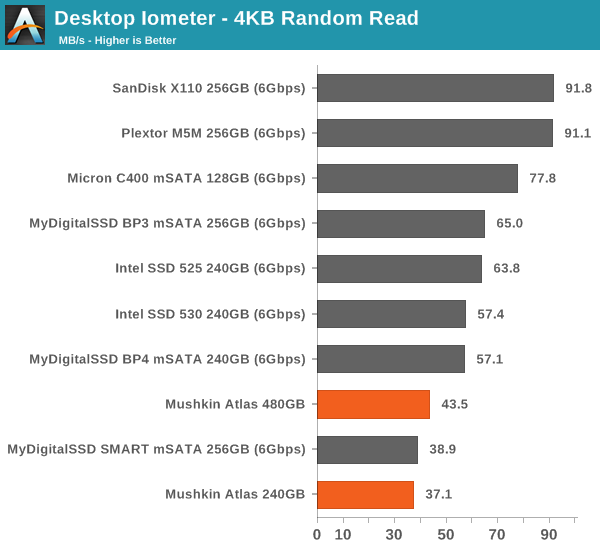
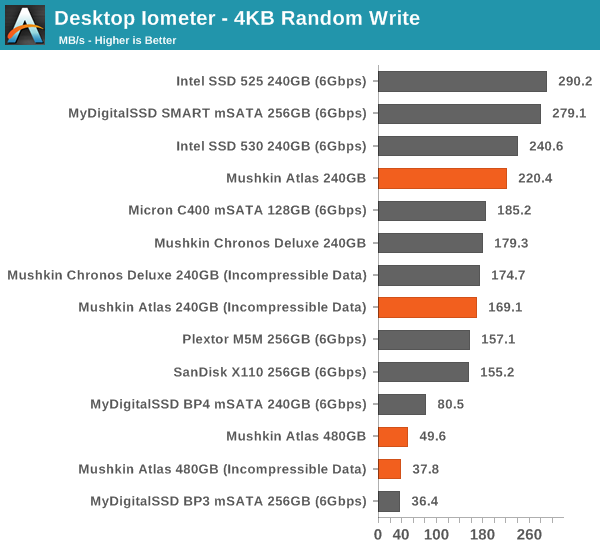
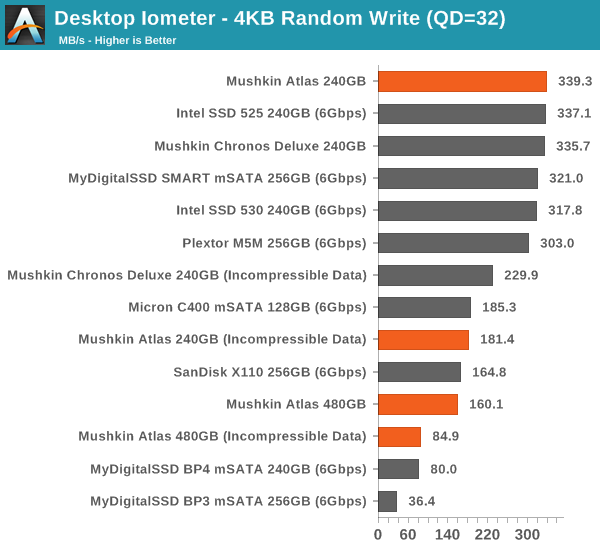
At 240GB, random write speeds are normal to SF-2281 but the 480GB model is noticeably slower. This isn't exceptional because the 480GB Vertex 3 (the only other 480GB SF-2281 SSD we've tested) exhibited similar behavior, although its performance was slightly better. I think the drop in performance has to do with raw processing power because when you double the capacity, the amount of pages/blocks that need to be tracked doubles as well. Newer controllers (like Marvell 88SS9187 and Samsung MDX) have no trouble tracking more pages/blocks but the SF-2281 design is over two years old, which is definitely showing up.
Sequential Read/Write Speed
To measure sequential performance I ran a 1 minute long 128KB sequential test over the entire span of the drive at a queue depth of 1. The results reported are in average MB/s over the entire test length.
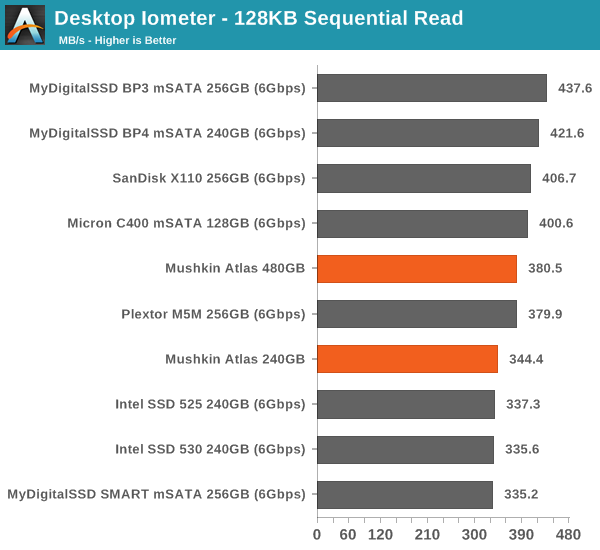
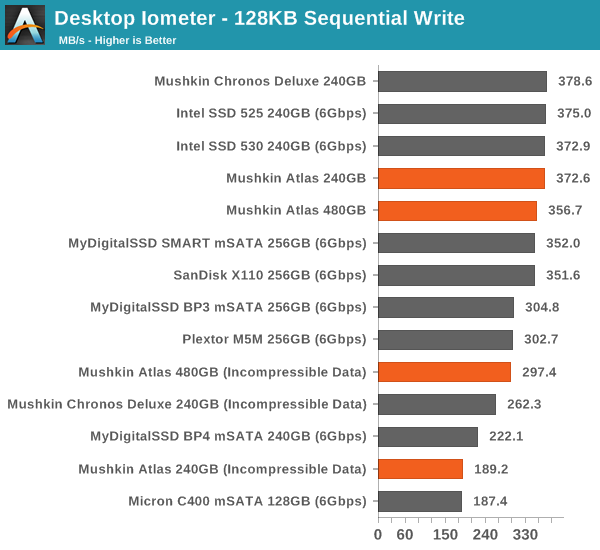
Sequential performance is average. When moving to incompressible data performance drops (as always) and especially the 240GB model experiences quite a big drop.
AS-SSD Incompressible Sequential Read/Write Performance
The AS-SSD sequential benchmark uses incompressible data for all of its transfers. The result is a pretty big reduction in sequential write speed on SandForce based controllers.
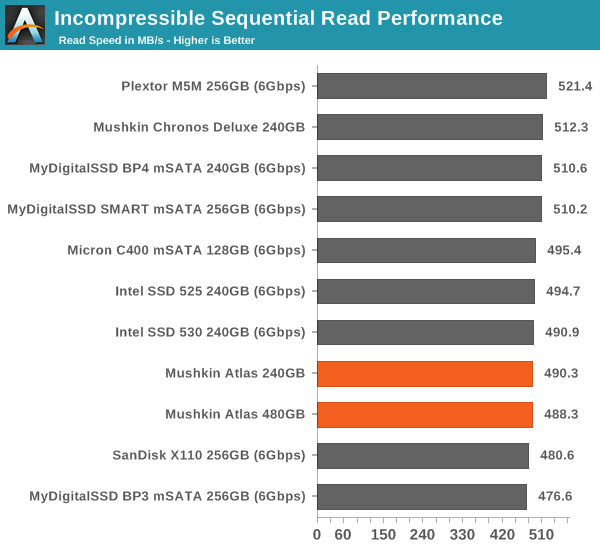
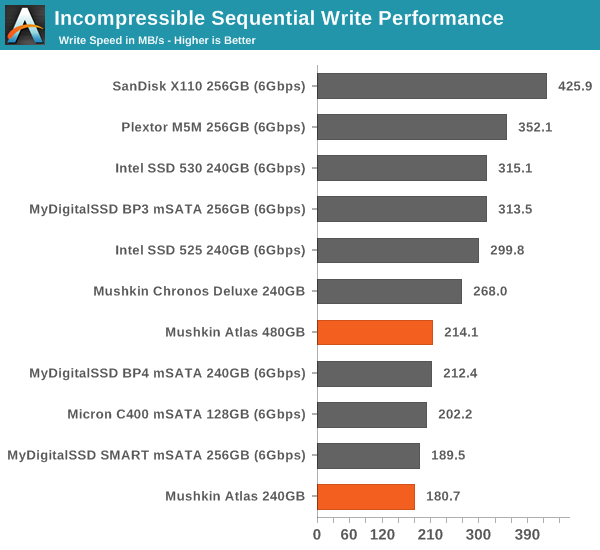










27 Comments
View All Comments
Death666Angel - Wednesday, December 18, 2013 - link
"I'd love to drop in a 120/250GB SSD and use it for the OS drive" -> Does your BIOS/UEFI even support that? I've often read that SSDs that are designed as caches in laptops are on artificially limited connectors.Death666Angel - Wednesday, December 18, 2013 - link
The only scenario for me to buy an mSATA SSD is to upgrade my Samsung XE700T1C which has a 128GB Samsung mSATA (830 variety I think). Upgrading to 240GB would be too small a step to justify the effort, so I'd just go with 480GB. And there, the M500 from Crucial retails for 250€ whereas the Atlas goes for 370€. Once Samsung enters the fray for good, I think they can undercut both. So I pass the Atlas offering. The 240GB offering is more price competitive, but it is still 15€ more expansive than the M500.As for "you don't really need any peripherals with an mSATA drive.", I'd like to get a small mSATA->USB case with the drive or at least the option for a kit that is 10€ more expansive.
chadwilson - Wednesday, December 18, 2013 - link
You lost me at Sandforce.cjs150 - Thursday, December 19, 2013 - link
Outside of mobile use, the one application that msata excels at would be for a very small HTPC. Take intels latest NUC, attach a 240 Gb msata and (if you need) an internal blu ray drive, preferably in a fanless case, and you have a great HTPC systemTamaraJKent - Tuesday, December 24, 2013 - link
hiTamaraJKent - Tuesday, December 24, 2013 - link
hiTamaraJKent - Tuesday, December 24, 2013 - link
hi